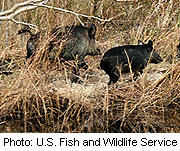
FRIDAY, Jan. 28 (HealthDay News) — The bacteria that causes tularemia is present in a high number of feral hogs in Texas and people need to use caution when handling wild game, say researchers.
Tularemia, commonly known as rabbit fever, is caused by infection with Francisella tularensis. Rodents, wild game and insects, such as ticks, deer flies and mosquitoes, can carry the bacteria.
In humans, infection can cause fever, lethargy, anorexia and signs of blood poisoning (septicemia). One subspecies of the bacteria that causes tularemia in animals and people — type B — is a less serious threat to people, but type A can be fatal in humans.
The team at Texas Tech University tested about 130 feral hogs from Crosby, Bell and Coryell counties and found evidence of past or current infection in 50 percent of those in Crosby County and 15 percent of those in central Texas.
“The bacteria are constantly present in animals in this area and the feral hog population, but normally it’s only a small number of cases. This is a huge number of infected animals,” said team leader Steve Presley.
Feral hogs range over large areas and can spread the bacteria wherever they go. The researchers are testing other animals for signs of the bacteria.
Caution is advised for anyone who may come into contact with wild animals, especially those who hunt or eat wild hogs.
“If you are handling or cleaning or eating wild game, particularly hogs, deer or rabbits, you should be wearing rubber gloves and eye protection when you’re dressing wild game,” Presley said in a news release from the university. “The bacteria can enter any sort of small cut or hangnail.”
“During this time of year, it might not be a big issue, but you should check yourself for ticks, wear tick repellent and avoid biting flies, including mosquitoes,” he added.
More information
The U.S. Centers for Disease Control and Prevention has more about tularemia.

